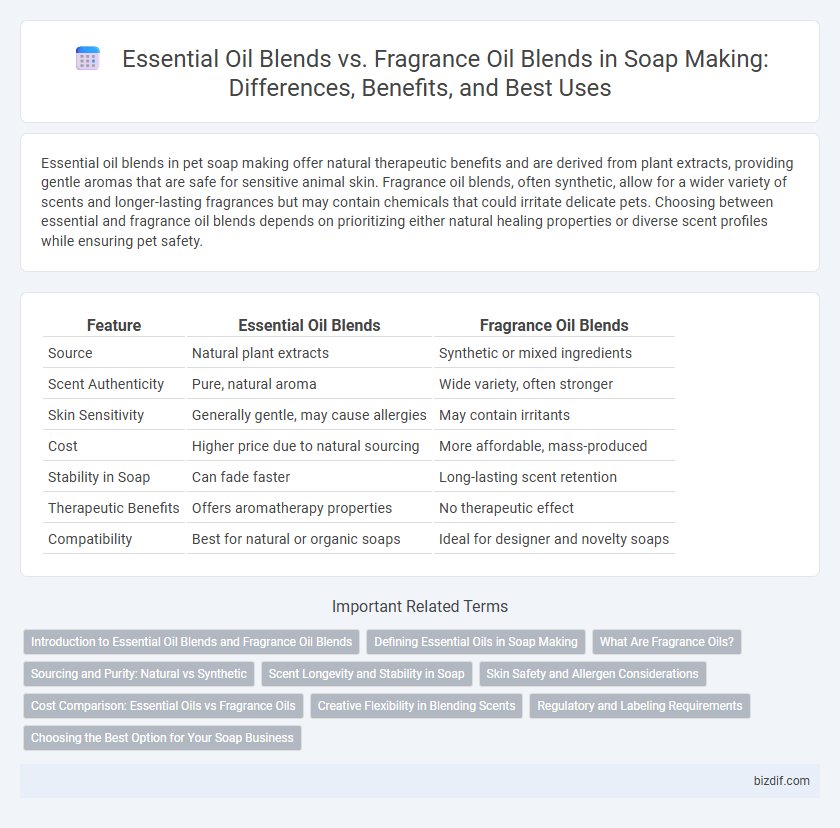Essential oil blends in pet soap making offer natural therapeutic benefits and are derived from plant extracts, providing gentle aromas that are safe for sensitive animal skin. Fragrance oil blends, often synthetic, allow for a wider variety of scents and longer-lasting fragrances but may contain chemicals that could irritate delicate pets. Choosing between essential and fragrance oil blends depends on prioritizing either natural healing properties or diverse scent profiles while ensuring pet safety.
Table of Comparison
| Feature | Essential Oil Blends | Fragrance Oil Blends |
|---|---|---|
| Source | Natural plant extracts | Synthetic or mixed ingredients |
| Scent Authenticity | Pure, natural aroma | Wide variety, often stronger |
| Skin Sensitivity | Generally gentle, may cause allergies | May contain irritants |
| Cost | Higher price due to natural sourcing | More affordable, mass-produced |
| Stability in Soap | Can fade faster | Long-lasting scent retention |
| Therapeutic Benefits | Offers aromatherapy properties | No therapeutic effect |
| Compatibility | Best for natural or organic soaps | Ideal for designer and novelty soaps |
Introduction to Essential Oil Blends and Fragrance Oil Blends
Essential oil blends in soap making consist of natural plant extracts that provide therapeutic benefits and authentic aromas, enhancing both scent and skin health. Fragrance oil blends, typically synthetic, offer a broader range of consistent and long-lasting scents but lack the natural healing properties of essential oils. Understanding the differences between these oils helps soap makers tailor their products to meet specific fragrance preferences and desired skin effects.
Defining Essential Oils in Soap Making
Essential oils in soap making are natural, volatile aromatic compounds extracted from plants, offering therapeutic benefits and authentic botanical scents. These oils contribute to the soap's aroma while providing skin-friendly properties such as antibacterial, antifungal, and anti-inflammatory effects. Unlike synthetic fragrance oils, essential oils are prized for their purity, complexity, and ability to enhance the soap's natural qualities.
What Are Fragrance Oils?
Fragrance oils are synthetic or natural aromatic compounds formulated to provide long-lasting and consistent scents in soap making. Unlike essential oils, fragrance oils often contain a blend of natural extracts, synthetic aroma chemicals, and carrier oils to achieve a wider variety of scents. These oils are designed to be skin-safe, color-stable, and affordable, making them popular for creating diverse soap fragrances that essential oils alone cannot replicate.
Sourcing and Purity: Natural vs Synthetic
Essential oil blends in soap making are derived from natural plant extracts, ensuring purity and therapeutic benefits sourced through steam distillation or cold pressing. Fragrance oil blends primarily consist of synthetic compounds, formulated to replicate natural scents with enhanced stability and a broader aroma range. Choosing essential oils guarantees all-natural ingredients, while fragrance oils offer consistent fragrance profiles often at a lower cost.
Scent Longevity and Stability in Soap
Essential oil blends offer natural scent profiles but often have lower scent longevity and can degrade faster during soap curing due to their volatile compounds. Fragrance oil blends are specifically formulated for enhanced stability and prolonged scent retention, ensuring the aroma remains strong throughout the soap's shelf life. Soap makers prefer fragrance oils for consistent scent performance, while essential oils appeal to those seeking natural ingredients despite their potentially shorter-lasting fragrance.
Skin Safety and Allergen Considerations
Essential oil blends in soap making offer natural skin benefits and tend to have fewer synthetic allergens, making them generally safer for sensitive skin compared to fragrance oil blends. Fragrance oil blends often contain synthetic compounds that can increase the risk of skin irritation and allergic reactions, necessitating thorough patch testing before use. Selecting oils with known allergen profiles and adhering to recommended usage rates ensures enhanced skin safety and minimizes adverse reactions.
Cost Comparison: Essential Oils vs Fragrance Oils
Essential oil blends typically cost more than fragrance oil blends due to the extraction process from natural plant materials and their higher purity levels. Fragrance oil blends are generally more affordable as they are synthetically produced, allowing for consistent scent profiles at a lower price. The cost difference influences soap makers' decisions based on budget constraints and desired product quality.
Creative Flexibility in Blending Scents
Essential oil blends offer natural aromatic profiles derived from plant extracts, providing therapeutic benefits and authentic scent variations ideal for artisanal soap making. Fragrance oil blends, synthesized to imitate complex aromas, allow greater creative flexibility with unique, consistent scents that may not be achievable with natural oils alone. Combining both types expands the palette for soap makers seeking innovative, balanced fragrance compositions tailored to diverse customer preferences.
Regulatory and Labeling Requirements
Essential oil blends in soap making are subject to strict regulatory guidelines set by bodies such as the FDA and IFRA, requiring accurate labeling of natural ingredients and potential allergens to ensure consumer safety. Fragrance oil blends, typically synthetic or mixed, demand compliance with chemical disclosure rules under TSCA and must include comprehensive ingredient lists on labels to meet international standards. Both types of blends necessitate adherence to country-specific labeling regulations, which affect marketing claims and packaging transparency to avoid legal repercussions.
Choosing the Best Option for Your Soap Business
Essential oil blends offer natural, therapeutic benefits and authentic aromas that appeal to eco-conscious customers, while fragrance oil blends provide a wider variety of scents and greater cost-effectiveness for large-scale soap production. Choosing the best option depends on your target market's preferences, ingredient sourcing priorities, and desired price point. Balancing natural appeal with variety and budget ensures your soap business meets diverse consumer demands effectively.
Essential Oil Blends vs Fragrance Oil Blends Infographic

 bizdif.com
bizdif.com